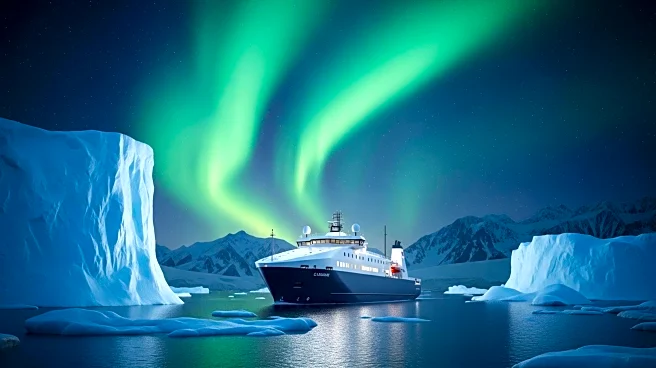What's Happening?
A Chinese container ship, operated by Sea Legend Container Line, has completed a groundbreaking voyage through the Arctic to a UK port, significantly reducing delivery times for electric vehicles and solar panels destined for Europe. This journey, which took half the time compared to traditional routes via the Suez Canal or Cape of Good Hope, was made possible by the Northern Sea Route, a passage through Arctic waters within Russia's exclusive Economic Zone. The voyage highlights China's efforts to strengthen maritime links with Europe amidst a trade dispute with the United States, as Beijing seeks to diversify export markets to sustain its economy. The Arctic region's warming climate has opened new shipping routes, although the conditions remain unpredictable.
Why It's Important?
The successful Arctic voyage by the Chinese freighter underscores the strategic importance of the Northern Sea Route as a faster alternative for global shipping, potentially reshaping trade dynamics between Asia and Europe. This development comes at a time when China is engaged in a trade dispute with the United States, prompting Beijing to seek alternative markets to mitigate economic risks. The reduction in delivery times could enhance China's competitiveness in the European market, impacting U.S. exporters who face longer shipping durations. Additionally, the voyage highlights the environmental implications of climate change, as melting Arctic ice opens new commercial opportunities but also poses ecological challenges.
What's Next?
The pioneering Arctic voyage may encourage other shipping companies to explore this route, potentially increasing traffic through the Northern Sea Route. This could lead to further geopolitical and environmental discussions, as countries with Arctic territories may seek to regulate and manage increased shipping activity. Additionally, the ongoing trade dispute between China and the United States may see further developments, with potential impacts on global trade policies and economic relations. Stakeholders in the shipping industry will likely monitor the viability and sustainability of Arctic routes as climate conditions continue to evolve.
Beyond the Headlines
The use of the Northern Sea Route raises ethical and environmental concerns, as increased shipping activity could threaten fragile Arctic ecosystems. The geopolitical implications of Arctic navigation also warrant attention, as countries with territorial claims may assert control over these emerging trade routes. Long-term, the shift towards Arctic shipping could influence global trade patterns, with potential impacts on traditional shipping lanes and associated economies.










